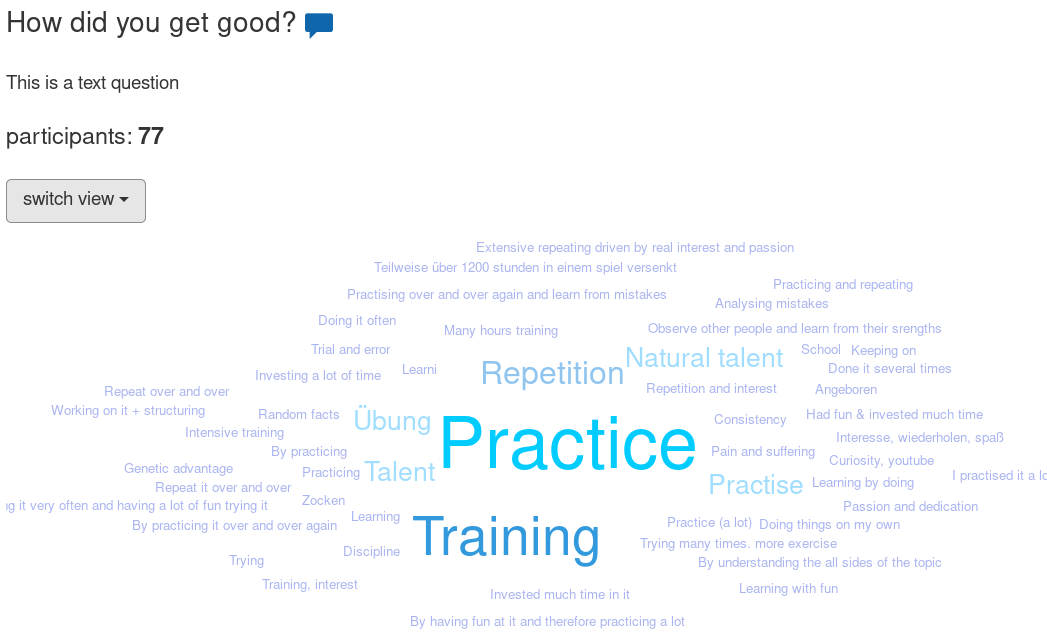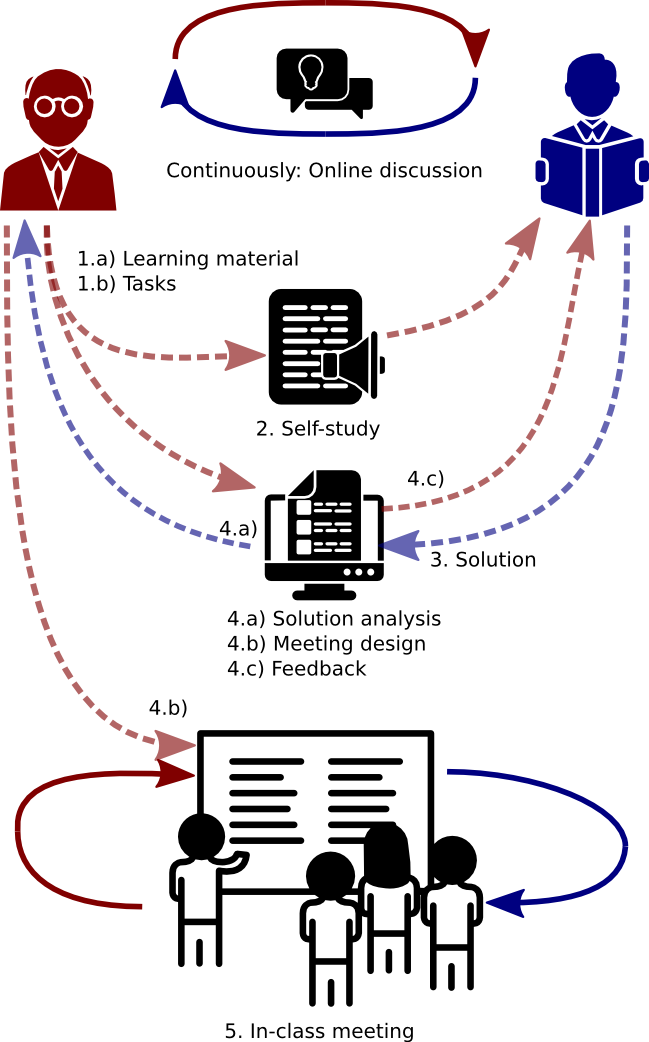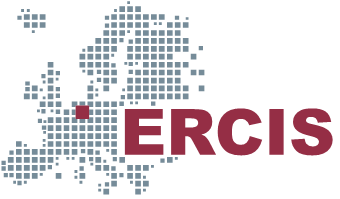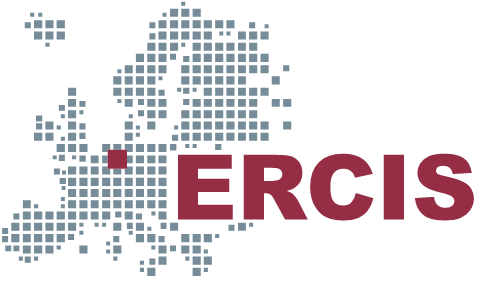Lessons Learned from the Flipped Classroom Concept
Motivation
Students know how to learn
- Activity for students in CSOS 2018 (from [SEI14])
- Think of something you are really good at
- Briefly describe how you got to be good at that thing
Submit how you got to be good

General Questions
- If learning requires practice …
- … should students learn in class?
- (What are the goals of class meetings?)
- … how can teaching support learning?
- … should students learn in class?
Agenda
Learning

“Learning” by lastspark under CC BY 3.0 US; cropped from the Noun Project
Brain ≈ Muscle
Learning involves brain’s long term memory
- Long term memory needs repeated retrieval and practice
- Spaced out over time
- Effect: Changes in brain’s proteins
- (Learning does not happen [solely] in lectures)
Deliberate Practice
Characteristics of Deliberate Practice to acquire expert skills ([Eri08], also [EKT93],[SEI14])
![training]()
“training” by Nithinan Tatah under CC BY 3.0 US; cropped from the Noun Project
- Task with well-defined goal
- Individual motivated to improve
- Feedback on current performance
- Ample opportunities for repetition and gradual refinements
(Traditional lecturing is “teaching by telling”, does not share any characteristic of Deliberate Practice)
Active Learning
Active Learning is an evidence-based umbrella term
Active Learning increases student performance in science, engineering, and mathematics ([FEM+14])
![Brain training]()
“Brain training” by Shocho under CC BY 3.0 US; cropped from the Noun Project
- Group problem-solving
- Worksheets or tutorials completed during class
- Use of personal response systems with or without peer instruction
- Studio or workshop course designs
- Flipped classroom, Just-in-Time Teaching
- Research-based learning and teaching (strategic goal of WWU)
- Notice: Above interventions share at least 3 of the 4 characteristics of Deliberate Practice
Flipped/Inverted Classroom
- In-class and at-home events flipped [LPT00],[BV13]
- Individual computer-based instruction paired with in-class group activities
- Individual learning shaped by individual background and preferences
- Lectures to discuss questions and work on exercises
- Individual computer-based instruction paired with in-class group activities
- Variant: Just-In-Time Teaching [NPG+99],[jittweb]
- Teaching and learning strategy based on web-based study
assignments (self-learning) and active learner classroom
- [MSN16] demonstrates impact for statistics courses
- Instructor designs class meeting just-in-time based on students’ submissions
- Teaching and learning strategy based on web-based study
assignments (self-learning) and active learner classroom
- Benefits
- Better preparation of in-class meetings
- Valuable shared time is used more effectively for student-instructor interactions
Feedback Cycles with JiTT

“Feedback cycles with JiTT” by Jens Lechtenbörger under CC BY-SA 4.0; from GitLab. Includes icons by The Noun Project under CC BY 3.0 US: Meeting by Ainsley Wagoner; knowledge sharing, professor, student, audio lesson, online task, online communication by ProSymbols.
Two Literature Pointers
[D+19] Actual learning vs feeling of learning
- Questions regarding statistical rigor
- One conclusion: Explain approach to students
- [SL17]: Critical view on digital transformation (in German)
Lessons Learned
Motivation and Improvement
- 2016: Classroom response system revealed lack of student
understanding in CSOS
- Yet, no in-class discussions, leaving me frustrated
- (Students saw no issue: Average grade in end-of-term evaluation was 1.8)
- Waste of our time
- After introduction of JiTT: Situation improved

Students’ Perception

Sample Feedback
- Misunderstandings
- “JiTT destroys our freedom!”
- “JiTT tasks are too difficult/open!”
- Encouragement
- “JiTT is/was a very good idea and was very helpful to understand the course’s content”
- “The JiTT-Assignment in combination with the lecture helped to understand the topics a lot!”
- “Please continue with this type of lecuture!”
Benefits and Challenges
- Benefits
- Much more fun in meetings with prepared students
- Sometimes unbelievably good solutions
- JiTT tasks helped tremendously to identify misunderstandings
and improve self-study material
- From wording to new larger units
- Much more fun in meetings with prepared students
- Challenges
- Regarding students
- Participation in class and in JiTT assignments
- Workload expectations
- Regarding myself
- Increased awareness of hurdles for students
- Regarding students
Dr. Jens Lechtenbörger
jens.lechtenboerger@ercis.uni-muenster.de
Lecturer
Leonardo-Campus 3
48149 Münster
Germany
Bibliography
- [BV13] Bishop & Verleger, The flipped classroom: A survey of the research, in: ASEE National Conference Proceedings, Atlanta, GA, 2013. https://www.asee.org/public/conferences/20/papers/6219/download
- [D+19] Deslauriers, McCarty, Miller, Callaghan & Kestin, Measuring actual learning versus feeling of learning in response to being actively engaged in the classroom, Proceedings of the National Academy of Sciences 116(39), 19251-19257 (2019). https://www.pnas.org/content/116/39/19251
- [EKT93] Ericsson, Krampe & Tesch-Römer, The role of deliberate practice in the acquisition of expert performance, Psychological review 100(3), 363 (1993). http://projects.ict.usc.edu/itw/gel/EricssonDeliberatePracticePR93.PDF
- [Eri08] Ericsson, Deliberate practice and acquisition of expert performance: a general overview, Acad Emerg Med 15(11), 988-994 (2008). https://www.onlinelibrary.wiley.com/doi/full/10.1111/j.1553-2712.2008.00227.x
- [FEM+14] Freeman, Eddy, McDonough, Smith, Okoroafor, Jordt & Wenderoth, Active learning increases student performance in science, engineering, and mathematics, Proceedings of the National Academy of Sciences 111(23), 8410-8415 (2014). https://www.pnas.org/content/111/23/8410
- [jittweb] Novak, What is JiTT?, 2019. https://jittdl.physics.iupui.edu/jitt/what.html
- [LPT00] Lage, Platt & Treglia, Inverting the classroom: A gateway to creating an inclusive learning environment, The Journal of Economic Education 31(1), 30-43 (2000).
- [MSN16] McGee, Stokes & Nadolsky, Just-in-Time Teaching in Statistics Classrooms, Journal of Statistics Education 24(1), 16-26 (2016). https://amstat.tandfonline.com/doi/abs/10.1080/10691898.2016.1158023
- [NPG+99] Novak, Patterso, Gavrin & Christian, Just-in-Time Teaching: Blending active Learning and Web Technology, Prentice Hall, 1999.
- [SEI14] Course Transformation Guide, UBC and CU Science Education Initiatives, 2014. http://www.cwsei.ubc.ca/resources/files/CourseTransformationGuide_CWSEI_CU-SEI.pdf
- [SL17] Schulmeister & Loviscach, Mythen der Digitalisierung mit Blick auf Studium und Lernen, Digitale Transformation im Diskurs: Kritische Perspektiven auf Entwicklungen und Tendenzen im Zeitalter des Digitalen , 1-21 (2017). http://nbn-resolving.de/urn:nbn:de:hbz:708-dh5756
License Information
Except where otherwise noted, this work, “Lessons Learned from the Flipped Classroom Concept”, is © 2017-2019 by Jens Lechtenbörger, published under the Creative Commons license CC BY-SA 4.0.
In particular, trademark rights are not licensed under this license. Thus, rights concerning third party logos (e.g., on the title slide) and other (trade-) marks (e.g., “Creative Commons” itself) remain with their respective holders.




